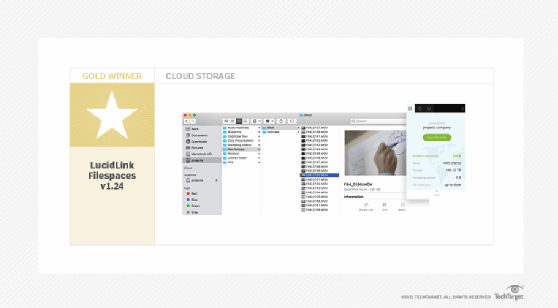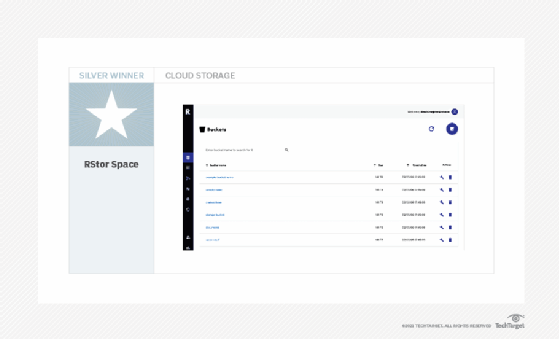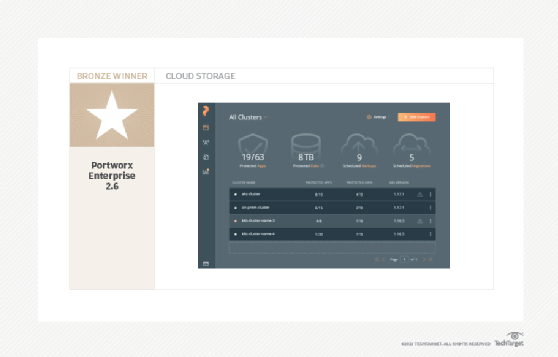
benedetti68 - Fotolia
The best enterprise cloud storage of 2020
Winners address cloud NAS, hosted cloud and cloud-native application management, highlighting the technology's growing importance in an evolving IT world.
The cloud became especially valuable in 2020 as the pandemic forced many organizations to reconsider their data center infrastructure strategy as facilities closed and staff worked from home.
Winners of the cloud storage category in the Storage magazine and SearchStorage Products of the Year competition address cloud NAS, hosted cloud and cloud-native application management. These best cloud storage offerings in 2020 show how the cloud is expanding as a storage tool and growing in adoption in an IT world that changed rapidly due to the COVID-19 pandemic.
LucidLink Filespaces v1.24 is among three products in this year's overall contest to win a second straight gold award.
That's quite an accomplishment for the four-year-old cloud NAS company, especially when you consider the list of finalists it competed against included HPE, IBM, cloud storage pioneer Nasuni and 2019 silver winner Hammerspace. None of those vendors finished in the top three this year.
Rounding out the best cloud storage in 2020 winners were cloud storage provider RStor Inc. with the silver and Portworx Inc., which picked up a bronze months after Pure Storage put up $370 million to acquire the Kubernetes storage vendor.
Gold winner: LucidLink Filespaces v1.24
Filespaces is a SaaS file system that works with the big three cloud providers -- Microsoft Azure support came about with the 1.24 release in 2020. It also supports object storage vendors, such as Scality and Cloudian, that can run in the cloud or on premises.
LucidLink Corp. claimed it quadrupled its business after the start of the pandemic, which reflects an accelerated move of unstructured data to the cloud. The vendor aims Filespaces mainly at media and entertainment collaborators, engineers and remote workers, who are in abundance these days.
Filespaces is a shared global namespace, working similar to traditional NAS. But because it is hosted on public clouds, Filespaces reduces latency. It can store primary file data, and includes data protection and compliance features such as immutable snapshots, global file locking and user access control.

LucidLink drew especially high scores from our judges for ease of integration and performance, with no clear weak spots.
"LucidLink is attacking a serious problem with cloud-based file access in a hybrid multi-cloud environment," one judge said. "Its work on latency reduction for remote access, in particular, is differentiated and compelling."
Another judge added, "It's quite innovative," although the pricing at $10 per tebibyte, per month "is just okay," among cloud storage services. However, another judge said LucidLink provides "a solid, straightforward service at a reasonable price."
Silver winner: RStor Space
RStor bills Space as fast object storage. It is part of RStor's PaaS, which includes on-premises and cloud-based infrastructure. The Cisco-funded cloud storage provider uses its mesh networking to replicate and shift objects between geographically dispersed points of presence for data protection. It encrypts data and stores three copies of all data in different locations. Customers can connect Space data to compute on AWS, Azure, Google or other public clouds.
RStor uses AI-based data analytics to store data in the most efficient place in its cloud, a process the vendor calls data superpositioning. RStor Space's performance is another selling point. Using the Cloud Object Storage Benchmark to measure performance, the vendor claims it moves large data objects -- ranging from terabytes to tens of gigabytes -- at least 10 times faster than rival cloud providers. It claims it can move objects measured in kilobytes and megabytes at least 20 times faster than competitors.

In 2020, RStor doubled the maximum capacity of its platform to 260 petabytes. RStor charges $4,718.69 per month, per copy for 1 PB of data. It does not charge ingress or egress fees for moving data in and out of its cloud.
The judges were most impressed with RStor Space's performance and innovation, although it lost ground on functionality.
"It's tough to distinguish cloud object storage in a crowded market," one judge said. "RStor Space seems to have done just that. It's competitive with the low end of the market … while standing out with its 'superpositioning' capabilities. Clever."
Another judge praised RStor for its "intelligent edge caching technology, and heuristic analytics that predict data requirements and move data accordingly."
Bronze winner: Portworx Enterprise 2.6
Portworx impressed Pure Storage enough that the flash storage company paid $370 million for the container storage startup. Products of the Year judges were also impressed by Portworx Enterprise, a platform for storing and protecting applications running on Kubernetes that consists of PX-Store, PX-Secure (encryption), PX-Migrate, PX-DR, PX-Backup and PX-Autopilot (capacity management).
Version 2.6 added node capacity rebalancing to move data from a full node to another node with space; it also enables Kubernetes application pods to access NFS shares and other external data sources from Portworx volumes. Additional enhancements enable Portworx storage clusters to operate during temporary interruptions of the Kubernetes etcd key value and to support lightweight Kubernetes K3 distributions built for edge deployments.

Portworx impressed our judges most for innovation and integration while scoring lower for performance.
"Portworx is one of the most compelling data management solutions for cloud-native workloads," one judge said. "Its integration with Kubernetes is second to none, and the ability to seamlessly integrate with Portworx's cloud-native backup solution is a big win."
Another judge called Portworx "one of the few providers focused on delivering data services for containerized applications/workloads requiring persistent storage. This level of functionality is typically not native to cloud storage provider platforms, and this has allowed Portworx to quickly expand into an area of unique opportunity."
Find out who won top honors in each of the five categories in the Storage magazine and SearchStorage 2020 Products of the Year competition.







